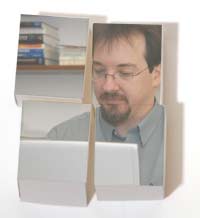By Jodi H. Beyeler
"Sometimes Christians who engage in business have wondered whether they are accepted as 'full-fledged' members of the church. The idea that business is dirty has a long history. I have written this book in the confidence that Christian entrepreneurs can 'please God' and can function as an integral part of the body of Christ.”
-
Carl Kreider '36 and former professor of economics and dean,
The Christian Entrepreneur (Herald Press, 1980)
When Del Good '62, professor of economics, began teaching at Goshen College in 1967, it was a time when some young people across the church were questioning whether being in business and being a Christian were compatible, and it wasn't uncommon to hear the raging Vietnam protests closely linking business in general with the war.
Good tells the story of an early 1970s gathering of Mennonites in business who met in a Chicago chain hotel near the airport. A group of a dozen Goshen students came to protest what they perceived as too luxurious and worldly surroundings. When the businesspersons, Mennonite Economic Development Associates (MEDA) founders, invited the students to share a meal, "it was a moral dilemma for the students if they should accept the meal while sharing their concerns,” Good said.
A lot has changed, observes Len Geiser '57, founder and director
emeritus of the Family Business Program, on campus and in the church
in terms of views on business. He believes organizations like MEDA,
and its predecessors, have done a lot of good – in doing economic
development abroad, but also with developing relationships and conversations
between the church, business and academic communities.
When Geiser first came to Goshen College as a student in the 1950s, there was no official business department, although classes were offered in commerce, economics and accounting. But his experience in his family's business led him to interest in that field.
As a family business owner in a Mennonite community, he experienced the tension that can exist between business and the church; the church perhaps didn't understand the daily realities businesspersons faced and were skeptical about how faith and business could go together. Geiser soon realized many business people were experiencing the same thing, and being asked, "Is business an honorable profession to be in?” The business community heard the church saying that if they were successful they must be doing something unethical, but on the other hand the church was coming to them asking for money.
Like most of the professors in the business department today, Phil Rush '85, associate professor of business information systems, has been involved with MEDA because "it puts me in touch with people who take business and their faith seriously,” he said. "I have a lot of respect for MEDA and its members. MEDA provides a forum for those who face the sometimes difficult challenges that come with combining business and faith to share with others who understand. While those on the outside may criticize certain decisions that those involved in business make, it's not really fair unless they've faced the same situations themselves.”
On campus, the business department continues to contribute to the dialogue and nurture students to pursue "a high-quality business education that develops effective and ethical business leaders who integrate Christian values into their work,” as the department's mission states.
Taking faith into business

For Tim Yoder '88, associate professor of business information systems, the link between his personal faith and his work is critical. "For me personally, our purpose and our relationship with Christ isn't dependent on what we do in this world for a career,” he said. "Instead, I think that what we do for a career in this world is dependent on Jesus Christ.”
He points to recent business news headlines in which it is clear that "those decisions weren't made based on a relationship with Christ. If you have that relationship, the decisions you make, how you view money, how you relate with people and what you believe is ethical, are tested by that relationship,” he said.
"It concerns me if there are people with gifts in business, but they aren't using them because they are afraid of them because they have heard money and business are evil,” Yoder said. "My hope for business students here is that when they enter business, they know that it is okay to take Christ, their faith and their ethics with them wherever they go.”
As Good teaches his economics courses, which draw majors and nonmajors alike, he welcomes the opportunities to discuss the pros and cons of such issues as free trade and globalization that are hot topics in the media and also among student activists. "As an academic, I am here to help students with a lot of passion to put data and tools of analysis with their passion,” he said. "I hope to show them that there are a variety of ways to engage that passion.”
Rush had the opportunity to help students grapple with the questions around these economic issues and with the ramifications of globalization when he led SST in the Dominican Republic in 2002-03. "We live in a very complex world,” he said. For many students it was the first time that the issues they had read about or protested against while living back in the states were tangible.
"It's almost impossible to fully grasp the complexity of the market forces that are at work in the world today,” Rush said. "So the question for me then becomes 'What is the best way I can use my gifts and interests to make a constructive contribution to the outcome?' And the answer to that for
some people is clearly to get involved in business.” He sees that response as a valid witness in the world.
Michelle Horning '91, associate professor of accounting, emphasizes critical thinking and looking at other sides of an issue. "I try to teach my students to look at all sides of an issue and that if they are going to be against something, that they make sure they understand all of the issues,” she said. "Protesting for the sake of protesting isn't enough. We have failed if students haven't thought critically through the issues and examined all sides.”
How does that happen in the business classroom?
In the senior seminar classes he leads, Good encourages his students to talk about issues of corporate social responsibility and to consider what businesses owe to their communities. Students visit area businesses and interview executives. And they conduct an investment simulation, with their results evaluated by Mennonite Mutual Aid's (MMA) social responsibility investments staff.
Good perceives that stereotypes about different departments on campus still exist. At times his senior seminar classes worked at breaking those down by meeting with seniors from other departments and talking about the stereotypes they have of each other. "We talk about how stereotypes are rooted in something, but many stereotypes wouldn't hold up,” he said.
Horning, who traveled to Uganda last summer as a MEDA consultant to offer accounting help to a seed company and a dairy product producer, works to connect students with MEDA by taking seniors to the annual convention and involving them with local chapter events. Sometimes she uses the MEDA publication, "The Marketplace,” in class to illustrate a point.
Geiser, a teaching faculty member from 1981 until his recent retirement, often shared his philosophy on business with students. He encouraged them to view making money as a good thing and a byproduct of running a good business, but that more important was how they acquired it and how they used it. He sees the roles of the department are to help the campus to understand more clearly the economic system we live in - with its flaws and benefits - and to be models of good businesspersons.
Business department leaders have also participated over the years in broader church conversations about business issues and ethics.
For Good, social responsibility and ethical investing have been of particular interest throughout his career. He was part of a conference in the early 1970s at the college with Mennonite Foundation staff, and professors from the Bible and religion, history and business departments, talking about the need for better criteria for investing Mennonite money. The group concluded that it is important that guidelines be drawn, but there isn't a pure, clean, ethical line, and it is important to be reminded of what one stands for and have one's investment be consistent with one's values.
In the fall of 2001, a group of concerned individuals and agencies convened "A Mennonite Consultation on Economic Globalization.” Invited to participate were a cross-section of persons with differing perspectives. Rush felt like that was a good example of "real dialogue” happening, even though "we were all coming at it from different angles and tend to use different lenses through which to view the same circumstances.”
Using business to help others
In many college business programs it is assumed the primary goal of students is to make a lot of money. Horning doesn't hear a lot of GC business students say that is their motivation. "They really want to do something they like, and integrate business and what they do to help more than just themselves,” she said.
"I try not to just teach the accounting and business concepts, but when there is an opening to talk about how to deal with ethical dilemmas,” she said. "This is what differentiates our program from other business programs - that we incorporate the faith perspective and help students think about why they are in business and ask, 'What are you going to do with your degree to make the world a better place?'”
Suggested reading:
Calvin Redekop '49, former professor of sociology, co-edited Entrepreneurs in the Faith Community: Profiles of Mennonites in Business, published by Herald Press in 1996.
James Halteman '66, professor of business and economics at Wheaton College, wrote Clashing Worlds of Economics and Faith, published by Herald Press in 1995.
Daniel Kauffman '44, director of college relations and development from 1971 to 1986, authored Managers with God: Continuing the Work Christ Began, published by Herald Press in 1990.
Carl Kreider '36, former professor of economics and dean, wrote The Christian Entrepreneur, published by Herald Press in 1980.

